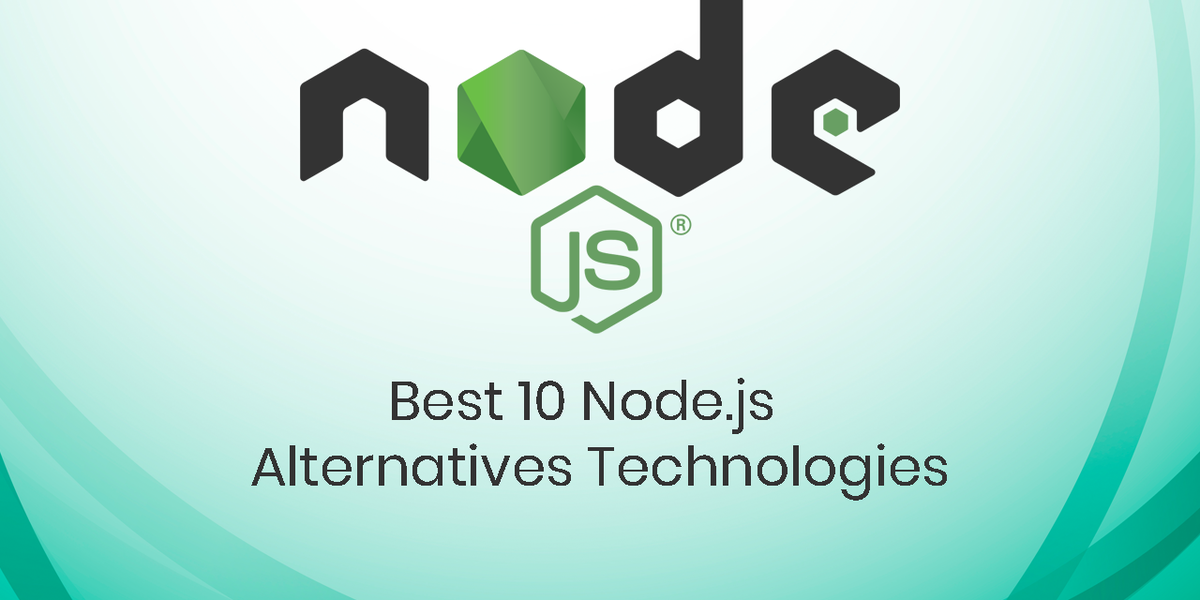
Akhil Davis



Looking for options beyond Node.js for your next web project? While Node.js remains popular, many developers are finding better fits with other technologies. This blog will get you through ten solid alternatives to Node.js that might work better for your specific needs.
Node.js is a platform that lets developers use JavaScript on the server side. It runs on Chrome's V8 engine and handles many tasks at once through its event-based system. This makes it good for real-time applications that need to process many connections at the same time.
Based on data from Wappalyzer, about 1.4 million websites run on Node.js. Here are some key facts:
As a business owner, you should know that Node.js isn't always the best choice:
Performance Issues: Node.js works great for handling many small tasks but struggles with heavy computing jobs that can block its single thread.
Team Skills: Your developers might already know Python, Java, or PHP very well. Using these languages could mean faster development and fewer mistakes.
Specific Needs: Some projects need strong data processing, machine learning, or enterprise features that other platforms handle better out of the box.
Proven Track Record: Some alternatives have longer histories in production environments, which means fewer surprises.
Complex Code: Managing callback functions and asynchronous code can get messy, even with modern JavaScript features.
Single-Thread Limitations: When Node.js handles CPU-heavy tasks, all users can experience slowdowns.
JavaScript Problems: JavaScript's flexible nature means some errors only show up when the program runs, not during development.
Package Management Headaches: The npm ecosystem has millions of packages, but quality and security can be concerning.
Python offers clear, readable code that developers love. When paired with web frameworks like Django or Flask, it becomes a powerful alternative to Node.js.
Key Benefits:
Top Websites Using Python:
Python shines when you need to process data, work with AI, or want a language that's easy to learn and maintain. Django gives you everything you need to build full-featured websites quickly, while Flask lets you start small and add only what you need.
Go (or Golang) was created by Google to build fast, reliable server software. It compiles machine code and handles many tasks at once with minimal resources.
Key Benefits:
Top Websites Using Go:
Go works best when speed and handling many users at once matter most. Its simplicity makes it great for microservices and cloud applications where resources must be used efficiently.
Created by the same person who made Node.js, Deno fixes many of Node's problems. It runs JavaScript and TypeScript with better security and modern features.
Key Benefits:
Top Websites Using Deno:
Deno works well for developers who like JavaScript but want better security and a more modern development experience. It's particularly good for edge computing and serverless functions.
Ruby on Rails follows conventions that help developers build web applications quickly with less code. Its focus on developer happiness has made it popular for startups and quick projects.
Key Benefits:
Top Websites Using Ruby on Rails:
Rails excels when you need to build something quickly to test an idea. Its conventions make it easy for teams to work together without spending time on configuration.
Spring Boot makes it easier to build Java applications by reducing setup work and providing useful defaults. It offers enterprise-grade features with less hassle.
Key Benefits:
Top Websites Using Spring Boot:
Spring Boot works best for business-critical applications where reliability and long-term support matter. It's a solid choice when your application needs to handle sensitive data or complex business logic.
Modern PHP has come a long way, especially with frameworks like Laravel and Symfony. These tools make PHP development cleaner and more enjoyable.
Key Benefits:
Top Websites Using Modern PHP:
PHP with modern frameworks works well for content-focused websites, e-commerce platforms, and projects that need simple hosting options. Laravel has especially changed how developers view PHP, making it much more pleasant to use.
Rust focuses on writing safe, fast code that avoids common bugs. When used with web frameworks like Actix or Rocket, it becomes a powerful server option.
Key Benefits:
Top Websites Using Rust:
Rust works best when top performance matters, like in gaming backends, high-volume API servers, or systems that must handle thousands of users at once.
Microsoft's ASP.NET Core works on Windows, Mac, and Linux. It combines the performance of C# with modern web development features.
Key Benefits:
Top Websites Using ASP.NET Core:
ASP.NET Core shines in corporate environments, especially those already using Microsoft products. Its performance and type safety make it good for large-scale applications.
Elixir runs on the same system that powers WhatsApp. The Phoenix framework adds web capabilities to create super-reliable, real-time applications.
Key Benefits:
Top Websites Using Elixir:
Elixir works best for applications that must stay online all the time, handle thousands of users simultaneously, or provide real-time updates. Chat apps, gaming platforms, and live dashboards benefit most from Elixir.
Bun is the newest option on this list. It aims to replace Node.js with much better performance while running the same JavaScript code.
Key Benefits:
Top Websites Using Bun:
Bun works best for developers who like Node.js but want better performance. You can often switch to Bun without changing your code much, getting speed improvements right away.
When picking a Node.js alternative, think about:
The best choice depends on your specific project needs and team skills.
While Node.js works well for many projects, exploring alternatives can lead to better solutions for your specific needs. Whether you want the readability of Python, the performance of Go or Rust, or the conventions of Ruby on Rails, there's likely a better fit for your next project.
The best developers don't limit themselves to one technology. By understanding these alternatives, you can choose the right tool for each job instead of forcing every problem to fit a single solution.
SoftVerses helps businesses build better software using the right technologies for each project. Our experts can evaluate your needs, recommend the best backend solution, and build reliable systems that grow with your business. We specialise in helping companies move from outdated technologies to modern alternatives that improve performance and reduce costs.
It depends. Django, a Python framework, is great for rapid development, security, and complex applications. Node.js is better for real-time apps and scalability. If you prefer Python’s simplicity, choose Django; for event-driven performance, go with Node.js.
2. Can Django replace Node.js?
Not exactly. Django is a high-level web framework, while Node.js is a runtime for JavaScript. Django simplifies backend development with built-in features, whereas Node.js provides more flexibility. The choice depends on project needs, language preference, and scalability requirements.
3. Is Node.js similar to Python?
No. Both build web servers but work differently. Node.js runs JavaScript and handles many connections simultaneously. Python is better for data processing and AI. Python runs line-by-line, while Node.js uses callbacks and promises for background tasks.
4. Is Node.js JavaScript?
Yes. Node.js runs JavaScript outside the browser. It enables server-side tasks like reading files, database connections, and handling network requests, extending JavaScript’s functionality beyond front-end development.
5. Is Node.js a framework?
No. Node.js is a runtime environment for JavaScript. Frameworks like Express.js, Nest.js, and Koa.js build on it, adding structure and tools for web development. Node.js itself enables JavaScript execution on servers.